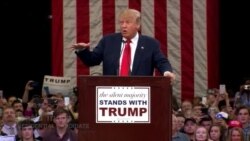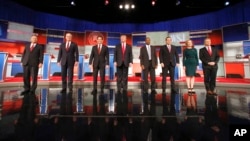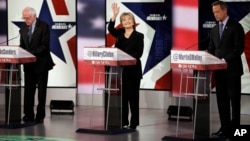Last week’s horrific terror attacks in Paris have thrust foreign policy and national security issues front and center in the 2016 U.S. presidential election campaign.
Republicans, led by Donald Trump, wasted little time in criticizing Democratic President Barack Obama’s handling of the threat posed by the Islamic State (IS) group. “Weakness has shown that when you are weak and ineffective, bad stuff does happen,” Trump told supporters at a rally in Tennessee.
Most of the other Republican contenders were also critical of the Obama administration’s approach and vowed a tougher line if elected.
President Obama was dismissive of the Republican critique of his policy toward the IS militants during a news conference at the G-20 summit in Turkey. “Folks want to pop off (speak out) and have opinions about what they think they would do, present a specific plan,” he said.
Political focus on Syrian refugees
Most of the Republican candidates also said they oppose the president’s plan to admit up to 10,000 Syrian refugees in the coming year.
“You allow 10,000 people in, and 9,999 of them are innocent people fleeing oppression, and one of them is a well-trained ISIS fighter. You have got a huge problem on your hands,” said Florida Senator Marco Rubio, speaking in Washington and referring to the Islamist militant group by another acronym.
Ben Carson, who remains near the top of the Republican pack in the latest polls along with Trump, urged Congress to “extinguish” Syrian immigrant resettlement programs. “I would be very reticent to bring in people who are ideologically opposed to the ideal of America,” Carson told a news conference in Nevada.
Jeb Bush told NBC’s “Meet the Press” that Christians from Syria should be given the priority as refugees. Bush also said the president’s approach toward the IS group has failed.
State governors weigh in
About half of the state governors, the majority Republican, have also said they do not want to take in Syrian refugees. Many legal analysts, however, point out that the governors don’t have the authority to bar individuals once the refugees have been legally admitted into the United States.
The Democratic presidential contenders, including Vermont Senator Bernie Sanders, were more open to admitting Syrian refugees fleeing the chaos in their country. “When hundreds of thousands of people have lost everything and have nothing left but the shirts on their backs, we will not turn our backs on the refugees from Syria and Afghanistan,” Sanders told an enthusiastic crowd at Cleveland State University in Ohio.
Terrorism as election concern
The new focus on national security was also evident in the recent Democratic debate where former secretary of state Hillary Clinton outlined her approach to dealing with the Islamic State group. “We have to look at ISIS as the leading threat of an international terror network. It cannot be contained. It must be defeated.”
A new poll by Morning Consult shows security concerns among voters are increasing in the aftermath of the Paris attacks. The survey found 22 percent of those asked listed security issues as their top concern. The economy remains the primary concern for 36 percent, according to the poll.
The Morning Consult poll had Trump leading the Republican field at 38 percent, followed by Carson at 19 percent and Rubio and Texas Senator Ted Cruz tied for fourth place with 7 percent. In the Democratic race, Clinton led Sanders by a margin of 57 to 26 percent.
Continued doubt about sending troops
A new Reuters/Ipsos poll also found a majority of Americans want to intensify the fight against the IS group, but voiced strong reservations about the use of U.S. ground troops in either Syria or Iraq. Sixty-five percent in the poll said they objected to President Obama’s decision to send in Special Forces to counter IS, and 76 percent said they opposed the deployment of ground troops.
The new focus on terrorism could have an impact on the Republican field, where inexperienced outsiders like Trump and Carson are leading the field but have been vague about how they would deal with national security threats.
Independent analyst Charlie Cook said that could help more established Republican candidates when voters ask themselves key questions leading up to the caucuses and primaries early next year. “Who is going to be the Republican nominee? Who can win a general election? Who do you want to be the commander-in-chief to deal with all these problems? I suspect you are going to see this (support for outsiders) fade down a bit.”
Voters traditionally regard the state of the economy as a key election concern and that likely will be the case next year as well. All signs, however, point to foreign policy and national security issues also figuring prominently in the race for the White House.








